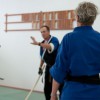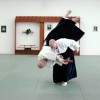
Kwan Um Do Kwang is a Zen sword practice that includes sword, long stick, striking arts, and self-defense techniques. At the heart of Kwan Um Do Kwang is traditional Buddhist temple sword martial arts. This fierce and highly effective sword practice originated in the mountain temples of Korea, and provides the grounding and high-tension energy that powers the study of the related martial arts in the Kwan Um Do Kwang system.
KUDK received its name and official sanction from Zen Master Seung Sahn, the Seventy-Eighth patriarch of the Chogye Order and a key spiritual leader of Zen Buddhism in Korea. While KUDK is a traditional martial art, it differs from most schools in a rather fundamental way. Not simply a synthesis of Korean swordsmanship, long stick, karate, and self-defense systems, KUDK also encompasses Zen meditation, Buddhist tantric practice, Shamanism.
KUDK received its name and official sanction from Zen Master Seung Sahn, the Seventy-Eighth patriarch of the Chogye Order and a key spiritual leader of Zen Buddhism in Korea. While KUDK is a traditional martial art, it differs from most schools in a rather fundamental way. Not simply a synthesis of Korean swordsmanship, long stick, karate, and self-defense systems, KUDK also encompasses Zen meditation, Buddhist tantric practice, Shamanism.
Services
Does one have to embrace Buddhism to join Kwan Um Do Kwang? A. No; KUDK is open to all faiths, backgrounds, and beliefs. We welcome diversity in all areas, including age, gender, religion, and physical and spiritual goals. We seek to teach martial arts, not to judge people. Is KUDK focused entirely on sword?
Reviews (1)
Ga R.
May 15, 2015
Report
I have trained with KJN Fortin for over a decade - and this is movement meditation at its best! He is an amazing teacher, and truly has a deep understanding of this Korean sword art (Kwan Um Do Kwang), and many other martial arts. I have seen so many parents and kids take the class together and thrive. Moreover, given his years of experience teaching, KJN Fortin is able to train and motivate people from all walks of life - from kids with little patience to people in their sixties who may have limited mobility.


